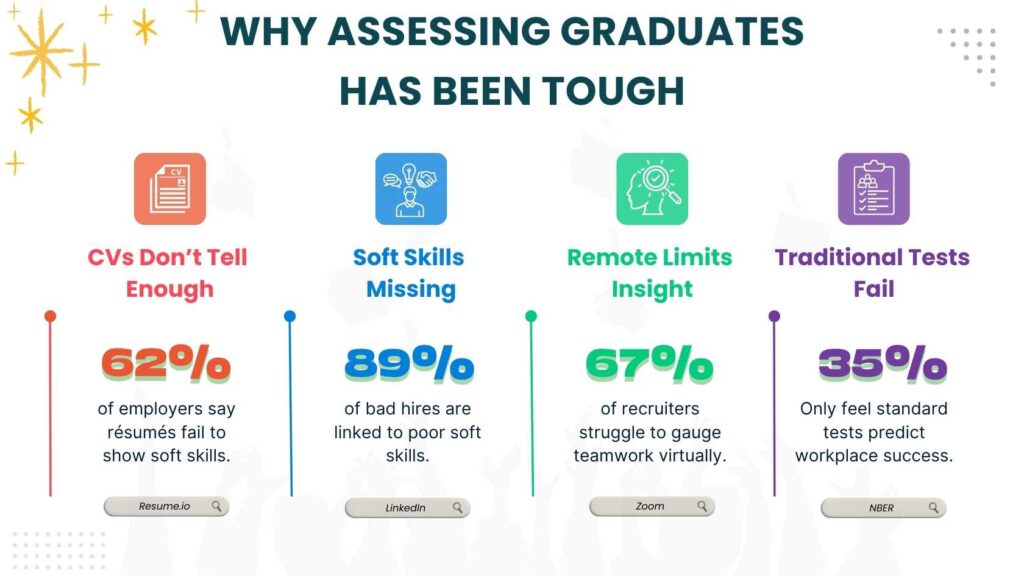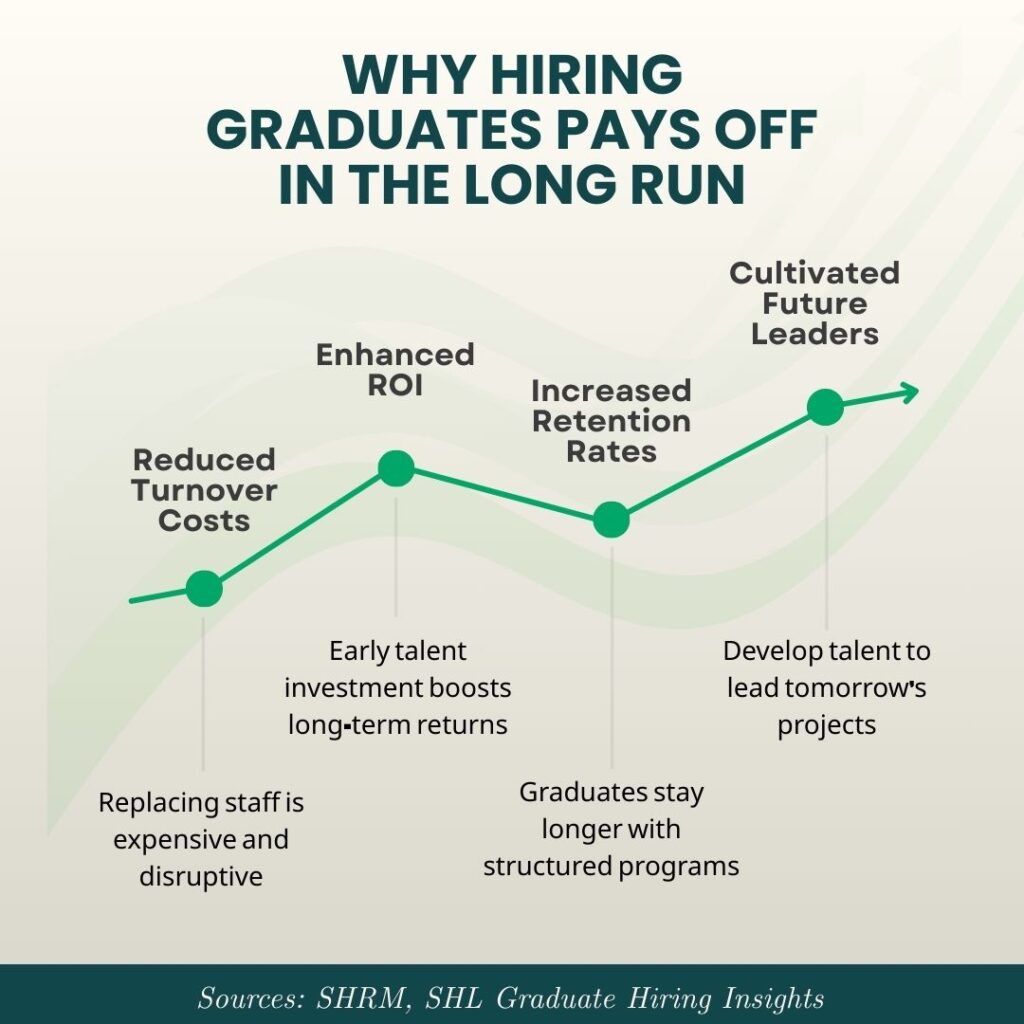This blog examines the top 10 graduate recruitment trends in 2025 and how to shape your graduate hiring in 2026 for the best results.
If you’ve been hiring graduates over the past few years, you already know how much has changed. From the sudden move to online interviews during the pandemic to the rise of AI tools shaping assessments, the process looks nothing like it once did.
And graduates themselves now expect more from you like speed, fairness, and a candidate experience that feels relevant to their world.
In 2025, these shifts are setting the stage for what’s next. This blog explores the skills you’ll need to look for, the tools reshaping recruitment, the challenges you’ll likely face, and the trends that could define graduate hiring in 2026.
What Employers Really Look for in Graduates
As a recruiter, you’re definitely not hiring just for today, you’re betting on who can grow with your organization tomorrow. That’s why the skills you look for in graduates have shifted.
It’s no longer enough to ask who has the right degree. Reports show problem-solving, adaptability, and digital fluency are now at the top of the list. And in a world where teams rarely sit in the same office, clear communication and collaboration skills matter just as much.
But here’s the sticking point. You won’t find those qualities in a polished CV, and you’ll only get glimpses of them in a short interview.
To see how a graduate really thinks, adapts, and works with others, you need assessments that feel closer to the real world, ones that let candidates show you how they perform, not just how they prepare.

How Technology is Rewriting Graduate Recruitment
Every major organization once relied on young hires who grew into its leaders. That pattern hasn’t changed but the value of graduates has grown sharper in today’s digital-first workplace.
Research shows companies with early-career programs see up to 24% higher retention and stronger succession outcomes.
Beyond cost savings, graduates bring curiosity, digital fluency, and the ability to adapt quickly traits harder to instill later in a career. For employers, backing graduates today is one of the surest ways to secure tomorrow’s leadership strength.


Why to Invest in Graduates?
There’s a study by SHRM showing that replacing even an entry-level employee can cost you nearly half their annual salary. If you’ve ever scrambled to backfill a role, you know how disruptive and draining turnover can be. Investing in graduates is one of the smartest ways to break that cycle.
When you bring young talent in early and actually develop them, you’re not just saving on replacement costs, you’re shaping people who grow with your culture.
They bring digital fluency, adaptability, and fresh ideas that help your team stay competitive. And over time, they often become your most loyal employees, the ones who lead projects, mentor others, and carry forward the DNA of your organization.

Top 9 Graduate Recruitment Trends of 2025
Here are the trends that are shaping graduate recruitment today. Knowing these will help you understand what’s changing, what matters most, and how to prepare for 2026.
1. Remote-First Recruitment
Remote work has shifted the way graduates are sourced and engaged. Recruiters now need to assess candidates’ readiness for virtual collaboration and evaluate soft skills in distributed settings.
This trend opens access to a wider talent pool, while requiring innovative approaches for engagement, onboarding, and performance evaluation.
For you, adopting remote-first practices ensures a more inclusive, flexible, and future-ready hiring process, meeting the expectations of a digitally native workforce.
2. Skills Over Degrees as New Hiring Imperative
In 2025, the emphasis has shifted from academic credentials to demonstrable skills. Employers are increasingly valuing practical abilities, problem-solving, and adaptability over traditional qualifications.
This shift is driven by the rapid pace of technological advancement and the need for a workforce that can quickly adapt to changing demands.
For instance, a survey found that 91% of companies implementing skills-based hiring experienced a reduction in their total time-to-hire, highlighting the efficiency and effectiveness of this approach.
3. Gamified Assessments for Employer Branding
Gamified assessments have rapidly become one of the most talked-about trends in graduate hiring. Leading companies like Nestlé, Masan, Coca-Cola, and HBL are using them to identify top talent faster and more reliably.
With The Talent Games’ C-Factor, candidates face situational judgment challenges and mini-games for cognitive ability, revealing how they think, solve problems, and adapt under pressure. The real magic happens when these assessments are paired with video interviews, giving you a richer, hybrid view of potential hires.
This trend is reshaping hiring rapidly. Recruiters report higher engagement, better-quality hires, and lower drop-off rates, while candidates enjoy an experience that’s interactive, fair, and even fun. You can’t ignore it if you want to enhance your employer branding to attract top talent.
4. Hyper-Personalized Candidate Journeys
Recruiters are leveraging AI-driven systems to create personalized candidate journeys. By gathering insights from candidate data such as skills, experience, and browsing habits employers can offer content, job recommendations, and updates that speak directly to each candidate’s career ambitions and values.
This approach not only enhances candidate engagement but also builds trust and drives higher application rates, as candidates feel more valued and understood.
5. Global Talent Without Borders
The rise of remote work has expanded talent pools, allowing companies to access candidates worldwide. This shift is particularly beneficial for organizations seeking diverse perspectives and specialized skills that may not be available locally.
However, it also presents challenges, such as managing time zone differences and ensuring effective communication across cultures. Companies that embrace these challenges and implement strategies to integrate global talent effectively will gain a competitive edge in the evolving job market.
6. Micro-Internships
Micro-internships are short-term, project-based opportunities that allow employers to assess a candidate’s skills and fit before making a full-time offer.
These internships provide graduates with meaningful experience and a clearer understanding of their career interests, while also allowing employers to evaluate potential hires in a real-world setting.
The flexibility and low-risk nature of micro-internships make them an attractive option for both parties in the hiring process.
7. Soft Skills as the Deciding Factor
While technical skills are essential, soft skills such as communication, adaptability, and emotional intelligence are increasingly influencing hiring decisions. A study by Harvard Business Review found that individuals who scored highly on soft skills were more likely to earn higher wages and advance in their careers. Employers are recognizing the importance of these human-centric skills and are incorporating assessments to evaluate them during the hiring process.
8. Sustainability and Purpose as Deal-Breakers
Graduates are placing greater emphasis on working for organizations that align with their values, particularly regarding sustainability and social responsibility.
A report by the World Economic Forum highlighted that climate trends are driving an increased focus on environmental stewardship, which has entered the list of top skills for the future. Companies that demonstrate a commitment to sustainability and ethical practices are more likely to attract and retain top talent, as candidates seek employers whose values mirror their own.
9. AI Interviewers
AI interviewers are transforming how graduates are assessed in the early stages of recruitment. They can ask structured behavioral questions, analyze responses, and detect problem-solving ability, adaptability, and communication patterns in real time.
For recruiters, this means a more efficient and consistent screening process, where insights are based on actual performance rather than assumptions. When combined with other assessment tools, AI interviewers provide a reliable, data-driven foundation for smarter hiring decisions.
10. Recruitment Chatbots
Recruitment chatbots have become essential for maintaining engagement throughout the hiring process. They can answer candidate questions instantly, provide updates, and schedule interviews, ensuring the experience feels seamless and responsive.
This reduces candidate anxiety and drop-off rates while freeing up recruiter bandwidth. For early-career graduates, who expect fast communication and clear guidance, chatbots create a more professional and positive recruitment experience, helping recruiters keep the talent pipeline active and engaged.
What These Graduate Hiring Trends Mean for 2026
The trends from 2025 are signals for how graduate recruitment will evolve. You need to anticipate changes in skills demand, candidate expectations, and technology adoption to stay ahead.
Graduates entering 2026 will expect personalized, fast, and meaningful experiences. Companies that continue using gamified assessments, AI screening, and project-based evaluations will have an edge in identifying high-potential talent efficiently.
These shifts also affect long-term workforce planning. Graduates are your future leaders, and hiring the right talent now ensures organizational resilience, stronger culture, and higher retention in the years ahead.
Action Steps for CHROs and TA Experts
To succeed in upcoming years, focus on practical, high-impact actions. Prioritize skills, use technology responsibly, and create flexible, value-driven recruitment models to attract, engage, and retain top graduate talent efficiently. Here are the best actions you should take:
Key Actions:
Build skills-based frameworks
Use gamified assessments and AI responsibly
Highlight employer brand, purpose, and values
Pilot micro-internships or trial projects
Focus on personalized candidate experiences
Conclusion: Turning Lessons into 2026 Strategy
2025 was a test run. You experimented with new tools, evaluated trends, and adapted to changing expectations. The insights gained now form the foundation for a smarter 2026 hiring strategy.
By understanding these trends, adopting hybrid approaches, and focusing on skills and values, you can make your graduate recruitment more efficient, engaging, and future-ready. The right hires now become the leaders who drive your success tomorrow.
